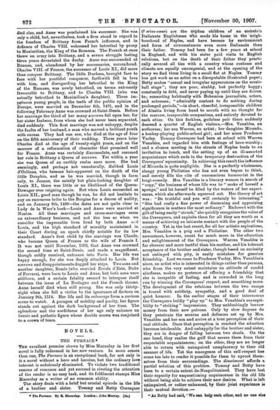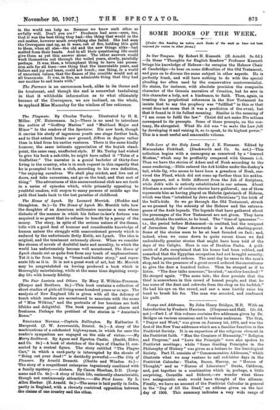NOVELS.
THE FURNACE.*
TEE excellent promise 'shown by Miss Macaulay in her first novel is fully redeemed in her new venture. In more senses than one, The Furnace is an exceptional book, for not only is it a novel without a hero and heroine, but the ordinary love interest is sedulously eliminated. To violate two traditional canons of romance and yet succeed in riveting the attention of the reader is no easy task, and its fulfilment stamps Miss Macaulay as a writer of no common ability.
The story deals with a brief but crucial episode in the life of a brother and sister. Tommy and Betty Crevequer
* Th• lurnaco. By B Macaulay. London: John Hurry. [64.] (P creve-cccur) are the orphan children of an eccentric Italianate Englishman who made his home in the 'neigh- bourhood of NaPles, and hive beconie liy environment and force of circumstances even more Italiauate than their father. Tommy had been for a few years at school in England, and with his sister paid visits to English relations, but on the death of their father they practi- cally severed all ties with a country whose customs and climate are equally uncongenial, and at the opening of the story we find them living in a small fiat at Naples. Tommy has got work as an artist on a disreputable illustrated paper; Betty makes "casual and irregular appearances on the music- hall stage"; they are poor, shabby, but perfectly happy ; constantly in debt, and never paying up until they are driven to; consorting habitually with Bohemian journalists, actors, and actresses; "admirably content to do nothing during prolonged periods,"—in short., cheerful, irresponsible children of Alsatia living from hand to mouth with no thought for the morrow, inseparable companions, and entirely devoted to each other. On this feckless, guileless pair there suddenly descend a quartet of English visitors,—Mrs. Venables, an authoress; her son 'Warren, an artist ; her daughter Miranda, a hockey-playing public-school girl; and her niece Prudence Varley. Tommy Crevequer had been at school with Warren Venables, and regarded him with feelings of hero-worship ; and a chance meeting in the streets of Naples leads to an invitation to lunch, and the setting up of an ill-assorted acquaintance which ends in the temporary destruction of the Crevequers equanimity. In achieving this result the influence of Miranda is quite negligible. She is a perfectly wholesome, slangy young Philistine who has not even begun to think, and merely fills the role of unconscious humourist in the tragi-comedy. Mrs. Venables is a literary woman in search of "copy," the business of whose life was to " make of herself a sponge," and let herself be filled by the waters of her experi- ences, which she afterwards squeezed out. Her theory of art was : "Be truthful and you will certainly be interesting." "She had really a fine power of discerning and appraising significance in matters the most ordinary." Endowed with the gift of being easily " struck," she quickly recognises the value of the Crevequers, and exploits them for all they are worth as a means of achieving an intimate contact with the people of the country. Yet in the last resort, for all her artistic aspirations, Mrs. Venables is a prig and a Philistine. The other two newcomers, however, count for much more in the education and enlightenment of the Crevequers. Warren Venables is far cleverer and more tactful than his mother, and his tolerant acceptance of the brother and sister, though based on curiosity not untinged with pity, is easily mistaken for genuine friendship. Last we come to Prudence Varley, Mrs. Venables's niece, an artist who is interested in things rather than persons, who from the very outset maintains an attitude of candid aloofness, makes no pretence of offering a friendship that she is incapable of feeling, and is rewarded in the long run by winning the Crevequers' respect, and something more. The development of the relations between the two camps is traced with subtlety, sympathy, and a good deal of quiet humour. In the earlier stages of their intercourse the Crevequers boldly "play up" to Mrs. Venables's suscepti- bility to " striking " impressions. They unblushingly borrow money from their new patrons. Only • by slow degrees do they penetrate the screens and defences set up by Mrs. Venables and her son and arrive at a true perception of their real attitude. Once that perception is reached the situation becomes intolerable. And unhappily for the brother and sister, they are in danger of falling between two stools. On the one hand, they realise the gulf that severs them from their respectable acquaintances; on the other, they are no longer able to return with unimpaired complacency to their old manner of life. Yet the emergence of this self-respect has come too late to render it possible for them to uproot them- selves from their surroundings. The denotement affords a partial solution of this problem. Tommy and Betty have been to a certain extent de-Neapolitanised. They have lost their capacity for unquestioning acquiescence in the old life without being able to achieve their new desires. What is left unimpaired, or rather enhanced, by their joint experience is their mutual devotion :— " AB Betty had said, We can help each other, and no one else in the world can help us. Because wo know each other so awfully well. Don't you see ?' Prudence had seen—seen, too, that it was the best thing they had—the thing that would in the end matter, however much everything else failed. She had seen the Crevequers cast up, as it were, out of fire, holding this gold to them, when all else—the old and the new things alike—had melted from their hands. And to all their questioning life could give them as yet this answer alone. The other answers would work themselves out through the veiled years, slowly, painfully perhaps. It was, then, a triumphant thing to have one posses- sion safe for alt time—one thing that the inscrutable years, and failure and joy and tears, could not touch ; one thing, in a world of uncertain values, that the flames of the crucible would not at all transmute. It was, in fine, an admirable thing that they had one another to sail boats with."
The Furnace is an uncommon book, alike in its theme and its treatment, and though the end is somewhat tantalising in that it withholds information as to what ultimately became of the Crevequers, we are inclined, on the whole, to applaud Miss Macaulay for the wisdom of her reticence.



















































 Previous page
Previous page